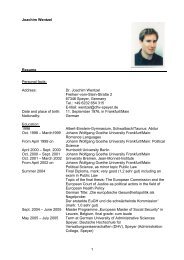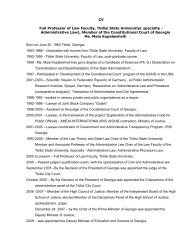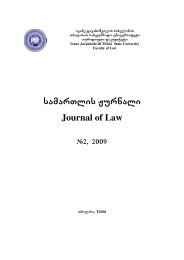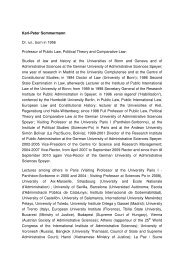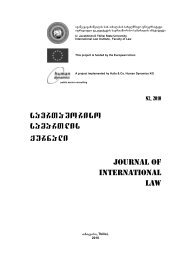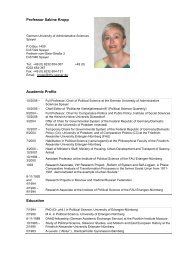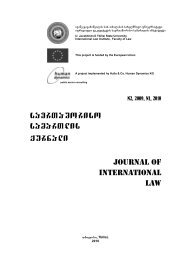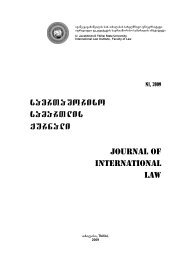Untitled
Untitled
Untitled
You also want an ePaper? Increase the reach of your titles
YUMPU automatically turns print PDFs into web optimized ePapers that Google loves.
K. KHUTSISHVILI, SHALL PROTECTION OF SOVEREIGN IMMUNITIES SUPERSEDE PROTECTION...<br />
Analyzing the circumstances surrounding<br />
creation of the International Criminal Tribunal<br />
for the Former Yugoslavia and the International<br />
Criminal Tribunal for Rwanda it can be concluded<br />
that sovereignty of both – the former<br />
Yugoslavia and Rwanda were disregarded by<br />
the respective decisions of the Security Council,<br />
when the human rights situation in both<br />
countries reached a point of extreme abnormality,<br />
and international community decided<br />
to deal with the most appalling human rights<br />
situations. Following the same line of argumentation,<br />
as employed when considering the<br />
mentioned cases, it can be easily argued that<br />
when the situation is so harsh in terms of human<br />
rights abuses that the perpetrated acts<br />
equal to international crimes, the prosecution<br />
of these crimes must be entrusted to any national<br />
court, “pproperly constructed”, as mentioned<br />
by the Versailles Conclusion, to bring<br />
perpetrators to justice by all means available,<br />
and as soon as possible. This is not only important<br />
for the prosecution of already committed<br />
crimes, but this may also play a role of<br />
deterrent and contribute to preventing future<br />
atrocities. Realizing the importance of these<br />
actions, as well as considering the fact that<br />
sovereign equality of states has already been<br />
not once violated by other states, being that<br />
through decisions of the Security Council or<br />
by way of organizing the “victors’ justice” oriented<br />
tribunals, it is not legitimate to argue<br />
that prosecution of international crimes by<br />
national courts of any state, irrespective of a<br />
bone with the perpetrated crime will be an action<br />
directed against sovereign equality of<br />
states.<br />
Recent developments have given even<br />
more reason to consider the judicial settlement<br />
of this issue in any domestic court more reasonable<br />
and both – legally and morally justifiable.<br />
The developments that are reviewed in<br />
the following Chapter are much more controversial<br />
than the idea of prosecuting criminal<br />
leaders of any sovereign state by another<br />
might be. So called “humanitarian intervention”<br />
will be analyzed in order to contrast them with<br />
the possibility of undertaking criminal prosecutions,<br />
disregarding the pleas of immunity and<br />
showing that there may be worse threats to<br />
sovereignty of states than prosecution of<br />
individual – however highly placed – perpetrators.<br />
IV. UNIVERSAL JURISDICTION AND A NEW<br />
ATTEMPT TO PROTECT HUMAN RIGHTS –<br />
HUMANITARIAN INTERVENTION<br />
To prosecute any perpetrator of human<br />
rights atrocities, a respective jurisdiction 55 must<br />
be established. This Chapter will briefly introduce<br />
a topic of jurisdiction, as protection of<br />
sovereign equality of states is also related to<br />
the concept of jurisdictions: “Jurisdiction concerns<br />
the power of the state to affect people,<br />
property and circumstances and reflects the<br />
basic principles of state sovereignty, equality<br />
of states and non-interference in domestic<br />
affairs. Jurisdiction is a vital and indeed central<br />
feature of state sovereigntyp”. 56 A notion<br />
of jurisdiction falls within the scope of the interest<br />
of this essay, and is dealt with in this<br />
Chapter, as much as it is argued in the essay<br />
that criminal responsibility for international<br />
crimes must by all means be subject to “universal<br />
jurisdiction”, and thus, sovereign immunities<br />
may not be claimed as a shield for the<br />
highest level perpetrators of such crimes.<br />
Shaw argues, that “pwhile jurisdiction is closely<br />
linked with territory it is not exclusively so tied.<br />
Many states have jurisdiction to try offences<br />
that have taken place outside their territory...” 57<br />
Shaw further states that “[diplomats], for example,<br />
have extensive immunity from the laws<br />
of the country in which they are working and<br />
various sovereign acts by states may not be<br />
questioned or overturned in the courts of a<br />
foreign country”. 58<br />
Of all the principles of jurisdiction the universality<br />
principle is of interest for the purposes<br />
of this essay. Universal Jurisdiction 59 “is at a turning<br />
point”, argues Broomhall, 60 mentioning that<br />
“this doctrine stands poised to become an integral,<br />
albeit supplemental component of the<br />
emerging international justice system. At the<br />
same time, serious obstacles stand in the way<br />
of its realization as a consistently available tool<br />
of fair and impartial enforcement”. 61 These difficulties<br />
derive mainly from the continued assertion<br />
of sovereign immunity and granting it quite<br />
an importance in international relations. Universal<br />
jurisdiction is an interesting concept for the<br />
purposes of this Essay, as it disregards the different<br />
mechanisms of protection and provides<br />
a possibility for domestic courts of any state to<br />
bring perpetrators of international crimes to justice,<br />
despite the nexus the committed crimes may<br />
have with a prosecuting state. It can be argued<br />
71




